
”Every social mechanism appears to have a dual potential for good and evil. Prepayment for medical care is no exception. On the one hand, it provides assurance of necessary care as a safeguard to health, economic well-being, and peace of mind. On the other hand, it opens the way to wasteful and harmful care, to price inflation, and to concealed redistributions in socially undesirable directions. The problem is to devise a plan that allows us to reap the most advantages while we incur the fewest drawbacks.”
Benefits in Medical Care Programs is a comprehensive treatment of this problem. Dr. Donabedian begins with a clear and straight forward analysis of his own assumptions about the social mandate for medical care benefits, the objectives of medical care programs, and the magnitude and distribution of the unmet need that these programs are designed to alleviate. The problem of defining and measuring the need for care is considered within the con text of the data yielded by alternative definitions. The analysis then shifts to the impact of benefits on certain key features of the medical care system.
Program benefits are weighed against program objectives, and policy implications are drawn from this comparison. We are shown what can and cannot be accomplished through medical care benefits and what goals are served by specific aspects of existing or proposed plans. Although Dr. Donabedian counsels a fairly thorough reform of existing systems, he remains skeptical about the possibility of designing a perfect system, and he does not hesitate to point out that increased access to care "increases exposure to both what is good and what is bad in our system of medical care. . . The machinery of medical care has a sinister potential for those who fall into it in the wrong place at the wrong time.
Dr. Donabedian's previous book Aspects of Medical Care Administration has been called the "bible" of its field. Benefits in Medical Care Programs should prove equally invaluable.
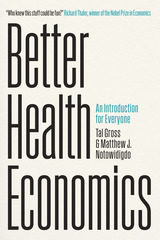
An ideal entry point into health economics for everyone from aspiring economists to healthcare professionals.
The economics of healthcare are messy. For most consumers, there’s little control over costs or services. Sometimes doctors are paid a lot; other times they aren’t paid at all. Insurance and drug companies are evil, except when they’re not. If economics is the study of market efficiency, how do we make sense of this?
Better Health Economics is a warts-and-all introduction to a field that is more exceptions than rules. Economists Tal Gross and Matthew J. Notowidigdo offer readers an accessible primer on the field’s essential concepts, a review of the latest research, and a framework for thinking about this increasingly imperfect market.
A love letter to a traditionally unlovable topic, Better Health Economics provides an ideal entry point for students in social science, business, public policy, and healthcare. It’s a reminder that healthcare may be a failed market—but it’s our failed market.
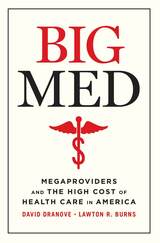
Drawing on decades of combined expertise in health care consolidation, Dranove and Burns trace Big Med’s emergence in the 1990s, followed by its swift rise amid false promises of scale economies and organizational collaboration. In the decades since, megaproviders have gobbled up market share and turned independent physicians into salaried employees of big bureaucracies, while delivering on none of their early promises. For patients this means higher costs and lesser care. Meanwhile, physicians report increasingly low morale, making it all but impossible for most systems to implement meaningful reforms.
In Big Med, Dranove and Burns combine their respective skills in economics and management to provide a nuanced explanation of how the provision of health care has been corrupted and submerged under consolidation. They offer practical recommendations for improving competition policies that would reform megaproviders to actually achieve the efficiencies and quality improvements they have long promised.
This is an essential read for understanding the current state of the health care system in America—and the steps urgently needed to create an environment of better care for all of us.

Since the 1970s health care costs in the United States have doubled, insurance premiums have far outpaced inflation, and the numbers of the uninsured and underinsured are increasing at an alarming rate. At the same time the public expects better health care and access to the latest treatment technologies. Governments, desperate to contain ballooning costs, often see a market-based approach to health care as the solution; critics of market systems argue that government regulation is necessary to secure accessible care for all.
The Catholic Church generally questions the market's ability to satisfy the many human needs intrinsic to any care delivery system yet, although the Church views health care as a basic human right, it has yet to offer strategies for how such a right can be guaranteed. Mary J. McDonough, a former Legal Aid lawyer for medical cases, understands the advantages and disadvantages of market-based care and offers insight and solutions in Can a Health Care Market Be Moral?
Drawing on Catholic social teachings from St. Augustine to Pope John Paul II, McDonough reviews health system successes and failures from around the world and assesses market approaches to health care as proposed by leading economists such as Milton Friedman, Regina Herzlinger, Mark Pauly, and Alain Enthoven. Balancing aspects of these proposals with Daniel Callahan's value-dimension approach, McDonough offers a Catholic vision of health care in the United States that allows for some market mechanisms while promoting justice and concern for the least advantaged.
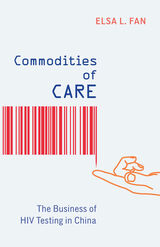
How global health practices can end up reorganizing practices of care for the people and communities they seek to serve
Commodities of Care examines the unanticipated effects of global health interventions, ideas, and practices as they unfold in communities of men who have sex with men (MSM) in China. Targeted for the scaling-up of HIV testing, Elsa L. Fan examines how the impact of this initiative has transformed these men from subjects of care into commodities of care: through the use of performance-based financing tied to HIV testing, MSM have become a source of economic and political capital.
In ethnographic detail, Fan shows how this particular program, ushered in by global health donors, became the prevailing strategy to control the epidemic in China in the late 2000s. Fan examines the implementation of MSM testing and its effects among these men, arguing that the intervention produced new markets of men, driven by the push to meet testing metrics.
Fan shows how men who have sex with men in China came to see themselves as part of a global “MSM” category, adopting new selfhoods and socialities inextricably tied to HIV and to testing. Wider trends in global health programming have shaped national public health responses in China and, this book reveals, have radically altered the ways health, disease, and care are addressed.
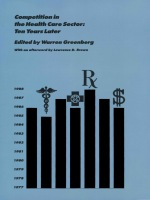
“Competition in health care has developed to a greater degree than most economists predicted ten years ago. That is the conclusion of Warren Greenberg in his introduction to Competition in the Health Care Sector: Ten Years Later, a retrospective of a 1977 Federal Trade Commission conference, which produced the landmark treatise Competition in the Health Care Sector: Past, Present, and Future. Seven of the ten original papers are reexamined; a chapter on the nursing home industry has been added.
“As with the original volume, Greenberg predicts that the retrospective will become a critical element in the health care economic literature.”—Hospitals

In France, Wilsford shows, the state is strong in the health policy domain, while organized medicine is weak and divided. Consequently, physicians exercise little influence over health care policymaking. By contrast, in the United States the state is weak, the employers and insurers who pay for health care are fragmented, and organized medicine is strong and well financed. As a result, medical professionals are able to exert a greater influence on policymaking, thus making cost control more difficult.
Wilsford extends his comparison to health care systems in the United Kingdom, West Germany, Italy, Canada, and Japan. Whether the private or public sector finances health care, he discovers, there is now an important trend in all of the advanced industrial countries toward controlling escalating costs by curbing both the medical profession’s clinical autonomy and physicians’ incomes.

Doctors are obviously influential in determining the costs of their services. But even more important, many believe, is the influence physicians have over the use and cost of nonphysician health-care resources and services. Doctors and Their Workshops is the first comprehensive attempt to use economic analysis to understand some of the physician effects on nonphysician aspects of health care.
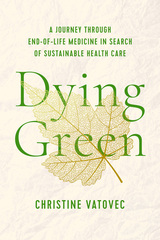
In Dying Green, award-winning educator Christine Vatovec offers an engaging study that asks us to consider the broader environmental sustainability of health care. Through a comparative analysis of the care provided to terminally ill patients in a conventional cancer ward, a palliative care unit, and an acute-care hospice facility, she shows how decisions made at a patient’s bedside govern the environmental footprint of the healthcare industry. Likewise, Dying Green offers insights on the many opportunities that exist for reducing the ecological impacts of medical practices in general, while also enhancing care for the dying in particular. By envisioning a more sustainable approach to care, this book offers a way forward that is better for both patients and the planet.
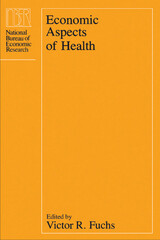

A timely investigation of the potential economic effects, both realized and unrealized, of artificial intelligence within the United States healthcare system.
In sweeping conversations about the impact of artificial intelligence on many sectors of the economy, healthcare has received relatively little attention. Yet it seems unlikely that an industry that represents nearly one-fifth of the economy could escape the efficiency and cost-driven disruptions of AI.
The Economics of Artificial Intelligence: Health Care Challenges brings together contributions from health economists, physicians, philosophers, and scholars in law, public health, and machine learning to identify the primary barriers to entry of AI in the healthcare sector. Across original papers and in wide-ranging responses, the contributors analyze barriers of four types: incentives, management, data availability, and regulation. They also suggest that AI has the potential to improve outcomes and lower costs. Understanding both the benefits of and barriers to AI adoption is essential for designing policies that will affect the evolution of the healthcare system.
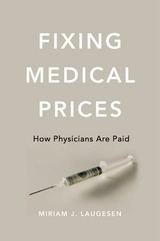
Medical care prices in the United States are not only the most expensive in the world, but there are wide variations in what physicians are paid. Doctors at the frontlines of medical care who manage complex conditions argue that they receive disproportionately lower fees than physicians performing services such as minor surgeries and endoscopies. Fixing Medical Prices goes to the heart of the U.S. medical pricing process: to a largely unknown yet influential committee of medical organizations affiliated with the American Medical Association that advises Medicare. Medicare’s ready acceptance of this committee’s recommendations typically sets off a chain reaction across the entire American health care system.
For decades, the U.S. policymaking structure for pricing has reflected the influence of physician organizations. What Miriam Laugesen’s rich analysis shows is how these organizations navigate the arcane and complex work of this advisory committee. Contradicting the story of a profession in political decline, Fixing Medical Prices demonstrates that the power of physician organizations has simply become more subtle.
Laugesen’s investigation into the exorbitant cost of American medical care will be of interest to those who follow the politics of health care policy, the influence of interest groups on rate setting, and the medical profession’s past and future role in our health care system.

Americans are understandably concerned about the runaway costs of medical care and the fact that one citizen out of seven is without health insurance coverage. Solving these problems is a top priority for the Clinton administration, but as Victor Fuchs shows, the task is enormously complex. In this book Fuchs, America's foremost health economist, provides the reader with the necessary concepts, facts, and analyses to comprehend the complicated issues of health policy. He shows why health care reform that benefits society as a whole will unavoidably burden certain individuals and groups.
Fuchs addresses such central questions as cost containment, managed competition, technology assessment, poverty and health, children's health, and national health insurance. The future of U.S. health policy, he argues, is tightly linked to three basic questions; First, how can we disengage health insurance from employment? Second, how can we tame technological change in health care? And finally how can we cope with the runaway medical costs of an aging society?
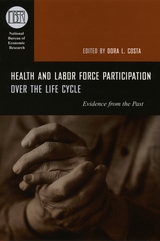
To that end, this book draws on new data-an extensive longitudinal survey of Union Army veterans born between 1820 and 1850-to examine the factors that affected health and labor force participation in nineteenth-century America. Contributors consider the impacts of a variety of conditions-including social class, wealth, occupation, family, and community-on the morbidity and mortality of the group. The papers investigate and address a number of special topics, including the influence of previous exposure to infectious disease, migration, and community factors such as lead in water mains. They also analyze the roles of income, health, and social class in retirement decisions, paying particular attention to the social context of disability.
Economists and historians who specialize in demography or labor, as well as those who study public health, will welcome the unique contributions offered by this book, which offers a clearer view than ever before of the workings and complexities of life, death, and labor during the nineteenth century.

Within the next twenty years, an unprecedented proportion of Americans will be over sixty-five. New research in the economics of aging is an essential element of understanding what the future holds for this aging population. Inquiries in the Economics of Aging presents both empirical papers that consider questions that are fundamental to public policy and more theoretical contributions that lay new groundwork for future research in the economics of aging.
Inquiries in the Economics of Aging provides a timely overview of some of the most important questions facing researchers on aging and outlines new techniques and models that may help to answer these questions. This important volume will be of great interest to specialists and policy makers as it paves the way for future analysis.

As millions of Americans are aware, health care costs continue to increase rapidly. Much of this increase is due to the development of new life-sustaining drugs and procedures, but part of it is due to the increased monopoly power of physicians, insurance companies, and hospitals, as the health care sector undergoes reorganization and consolidation. There are two tools to limit the growth of monopoly power: government regulation and antitrust policy. In this timely book, Deborah Haas-Wilson argues that enforcement of the antitrust laws is the tool of choice in most cases.
The antitrust laws, when wisely enforced, permit markets to work competitively and therefore efficiently. Competitive markets foster low prices and high quality. Applying antitrust tools wisely, however, is a tricky business, and Haas-Wilson carefully explains how it can be done. Focusing on the economic concepts necessary to the enforcement of the antitrust laws in health care markets, Haas-Wilson provides a useful roadmap for guiding the future of these markets.
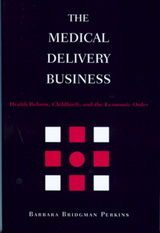
Americans at the end of the twentieth century worried that managed care had fundamentally transformed the character of medicine. In The Medical Delivery Business, Barbara Bridgman Perkins uses examples drawn from maternal and infant care to argue that the business approach in medicine is not a new development. Health care reformers throughout the century looked to industrial, corporate, and commercial enterprises as models for the institutions, specialties, and technological strategies that defined modern medicine.
In the case of perinatal care, the business model emphasized specialized over primary care, encouraged the use of surgical and technological procedures, and unnecessarily turned childbirth into an intensive care situation. Active management techniques, for example, encouraged obstetricians to accelerate labor with oxytocin to augment their productivity. Despite the achievements of the childbirth and women’s health movement in the 1970s, aggressive medical intervention has remained the birth experience for millions of American women (and their babies) every year.
The Medical Delivery Business challenges the conventional view that a dose of the market is good for medicine. While Perkins is sympathetic to the goals of progressive and feminist reformers, she questions whether their strategies will succeed in making medicine more equitable and effective. She argues that the medical care system itself needs to be fundamentally "re-formed," and the reforms must be based on democracy, caring, and social justice as well as economics.
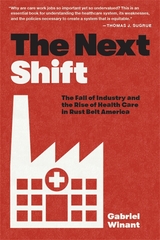
Winner of the Frederick Jackson Turner Award
Winner of the Isaac and Tamara Deutscher Memorial Prize
Winner of the C. L. R. James Award
A ProMarket Best Political Economy Book of the Year
Men in hardhats were once the heart of America’s working class; now it is women in scrubs. What does this shift portend for our future?
Pittsburgh was once synonymous with steel. But today most of its mills are gone. Like so many places across the United States, a city that was a center of blue-collar manufacturing is now dominated by the service economy—particularly health care, which employs more Americans than any other industry. Gabriel Winant takes us inside the Rust Belt to show how America’s cities have weathered new economic realities. In Pittsburgh’s neighborhoods, he finds that a new working class has emerged in the wake of deindustrialization.
As steelworkers and their families grew older, they required more health care. Even as the industrial economy contracted sharply, the care economy thrived. Hospitals and nursing homes went on hiring sprees. But many care jobs bear little resemblance to the manufacturing work the city lost. Unlike their blue-collar predecessors, home health aides and hospital staff work unpredictable hours for low pay. And the new working class disproportionately comprises women and people of color.
Today health care workers are on the front lines of our most pressing crises, yet we have been slow to appreciate that they are the face of our twenty-first-century workforce. The Next Shift offers unique insights into how we got here and what could happen next. If health care employees, along with other essential workers, can translate the increasing recognition of their economic value into political power, they may become a major force in the twenty-first century.

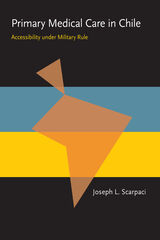


Examining the health care market in a historical framework, Drake analyzes the forces and events that have shaped American health care in the twentieth century and sheds new light on why and how our health care system has dampened competitive market forces and failed to provide sound value for much of our health care expenditures. He examines the roles that physicians, hospitals, insurance companies, businesses, individual consumers, and government legislation have played in creating a provider-dominated market in which the cost of care has been concealed from consumers. Comparing U.S. health care expenditures with those of other developed countries, he concludes that a significant part of our health care problem is the style of medicine practiced in the United States, which is much more specialized and high tech than in other developed nations.
Drake develops proposals for health care financing reform that consider the political and economic difficulties involved. He first examines the Clinton health care reform plan and makes specific recommendations for revisions that would improve its likelihood of controlling costs. He then offers an alternative proposal that would both maintain the principle of universal, noncancelable coverage and eliminate the flaws in the market for health care services by giving consumers a financial stake in cost containment.
This timely argument, combining economic and historical analysis with thoughtful consideration of the motivating humanitarian and political concerns, will be of interest to everyone seeking to understand and to reform our ailing health care system.

Neoliberals often point to improvements in public health and nutrition as examples of globalisation's success, but this book argues that the corporate food and medicine industries are destroying environments and ruining living conditions across the world.
Scientist Stan Cox expertly draws out the strong link between Western big business and environmental destruction. This is a shocking account of the huge damage that drug manufacturers and large food corporations are inflicting on the health of people and crops worldwide. Companies discussed include Wal-Mart, GlaxoSmithKline, Tyson Foods and Monsanto. On issues ranging from the poisoning of water supplies in South Asia to natural gas depletion and how it threatens global food supplies, Cox shows how the demand for profits is always put above the public interest.
While individual efforts to "shop for a better world" and conserve energy are laudable, Cox explains that they need to be accompanied by an economic system that is grounded in ecological sustainability if we are to find a cure for our Sick Planet.

To Live and Die in America details how the United States has among the worst indicators of health in the industrialised world and at the same time spends significantly more on its health care system than any other industrial nation.
Robert Chernomas and Ian Hudson explain this contradictory phenomenon as the product of the unique brand of capitalism that has developed in the US. It is this particular form of capitalism that created both the social and economic conditions that largely influence health outcomes and the inefficient, unpopular and inaccessible health care system that is incapable of dealing with them.
The authors argue that improving health in America requires a change in the conditions in which people live and work as well as a restructured health care system.
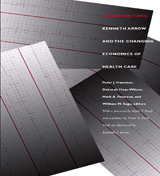
Coming from diverse backgrounds—economics, law, political science, and the health care industry itself—the contributors use Arrow’s article to address a range of present-day health-policy questions. They examine everything from health insurance and technological innovation to the roles of charity, nonprofit institutions, and self-regulation in addressing medical needs. The collection concludes with a new essay by Arrow, in which he reflects on the health care markets of the new millennium. At a time when medical costs continue to rise, the ranks of the uninsured grow, and uncertainty reigns even among those with health insurance, this volume looks back at a seminal work of scholarship to provide critical guidance for the years ahead.
Contributors
Linda H. Aiken
Kenneth J. Arrow
Gloria J. Bazzoli
M. Gregg Bloche
Lawrence Casalino
Michael Chernew
Richard A. Cooper
Victor R. Fuchs
Annetine C. Gelijns
Sherry A. Glied
Deborah Haas-Wilson
Mark A. Hall
Peter J. Hammer
Clark C. Havighurst
Peter D. Jacobson
Richard Kronick
Michael L. Millenson
Jack Needleman
Richard R. Nelson
Mark V. Pauly
Mark A. Peterson
Uwe E. Reinhardt
James C. Robinson
William M. Sage
J. B. Silvers
Frank A. Sloan
Joshua Graff Zivin


A provocative call to rethink America's values in health care.
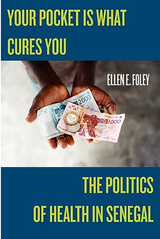
While offering a critique of neoliberal health policies, Your Pocket Is What Cures You remains grounded in ethnography to highlight the struggles of men and women who are precariously balanced on twin precipices of crumbling health systems and economic decline. Their stories demonstrate what happens when market-based health reforms collide with material, political, and social realities in African societies.
READERS
Browse our collection.
PUBLISHERS
See BiblioVault's publisher services.
STUDENT SERVICES
Files for college accessibility offices.
UChicago Accessibility Resources
home | accessibility | search | about | contact us
BiblioVault ® 2001 - 2024
The University of Chicago Press









